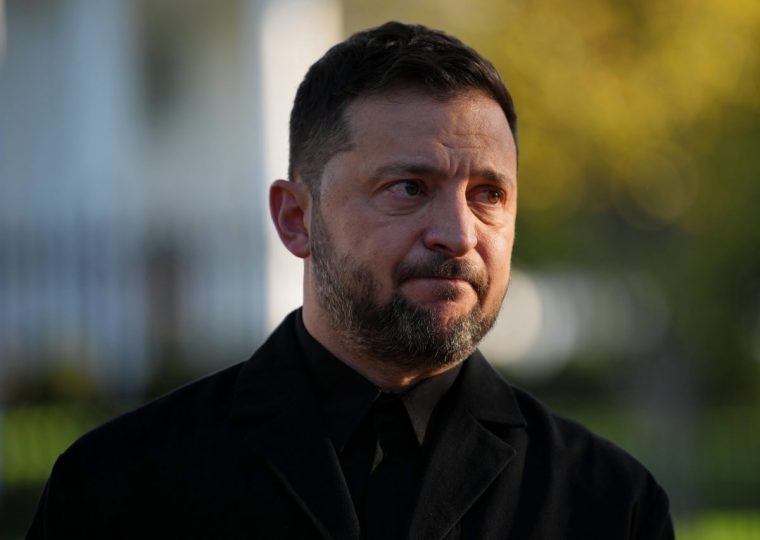Negotiations are at a stalemate but there still may be some levers Trump could pull to agree a ceasefire deal
Trump claimed victory in Gaza after brokering a peace agreement between Israel and Hamas.
As the ceasefire appears to be tentatively holding, the US President is now turning back to his other passion project: ending the war in Ukraine.
As Trump addressed the Knesset, Israel’s Parliament, following the Gaza deal, he made his plans clear, saying “we have to get Russia done”, and is due to meet with Putin in Hungary.
But after months of negotiations failed to bear fruit, what new levers can he pull to force peace with Putin, and will they have any effect?
Impose further sanctions
One option available to Trump is ramping up sanctions on Russia.
As successive sanctions packages have already been imposed on Russia, Trump would need to move to secondary sanctions targeting the countries supporting the Russian economy, particularly by buying its oil.
But Tony Brenton, the former UK ambassador to Russia, said that Trump is “unconvinced that sanctions are very effective – and is right”.
He added: “The fact is that the West now has the most massive set of sanctions which have ever historically been imposed on any country imposed on Russia, and the Russian economy has not collapsed.
“According to the people I’m talking to, it isn’t going to in the near future. They’re chewing away at the outer edges of the Russian economy, and Russia will probably go into recession, but it can survive it.”

Brenton, who has negotiated with Putin, said that even if the sanctions were crippling the Russian economy, the Russian President would be unlikely to bend.
“If a bureaucrat came into Putin and said, ‘Sir, Mr President, sanctions are damaging living standards in the country, shouldn’t we do something to accommodate them, by being willing to moderate our demands of Ukraine?’ That bureaucrat would spend the rest of his career counting paperclips in Siberia,” Brenton said.
“Putin cares much more deeply about Russian pride and national security than he does about the welfare of his own people. So there are good reasons for doubting that extra sanctions will turn Russia around.”
However, Trump appears to be pursuing a more informal sanctions package, persuading countries buying Russian oil – like India – to cut back.
Brenton said Trump “seems to have got some sort of assurance out of Modi that the Indians are going to at least cut back” on buying Russian oil.
Ramp up support for Ukraine
The US President could also step up his support for Ukraine, to increase military and diplomatic pressure on Putin.
There are already indications Trump might take this path, touting the possible indirect sale of Tomahawk missiles to Ukraine.
The Tomahawk Land Attack Missile is a long-range cruise missile typically launched from the sea to attack targets deep into enemy territory.
With a range of 2,500 km (1,500 miles), they could strike Moscow if used by Ukraine.
“I might say, ‘Look: if this war is not going to get settled, I’m going to send them Tomahawks,” the US President told reporters aboard Air Force One as he flew to Israel earlier this week.

“The Tomahawk is an incredible weapon, a very offensive weapon. And honestly, Russia does not need that.”
But he appeared to waver on the agreement after a meeting with Ukrainian President Volodymyr Zelensky on Friday, saying he hoped to end the war without Tomahawks.
Kremlin spokesperson Dmitry Peskov said last week that “the topic of Tomahawks is of extreme concern”, describing any sale as a “very dramatic moment” with “tensions escalating from all sides”.
Former Russian president Dmitry Medvedev warned that it was impossible to distinguish between Tomahawk missiles carrying nuclear warheads and conventional ones after they are launched, and hinted that Russia’s response to a Tomahawk attack may be nuclear.
Carrot and stick in other arenas
Trump may also be able to pull levers outside of the conflict itself, by offering attractive deals in areas of mutual benefit or exerting pressure in other areas.
“Trump can find other areas of business which Russia wants to do, and encourage them to say, look, we could do more on this if you are also being more cooperative on Ukraine,” Brenton said.
“For example, the Russians have just suggested extending the Strategic Arms Reductions Treaty, which runs out at the end of this year. They don’t want to get into a strategic arms race with the United States, and so that’s an obvious instrument.
“America wants to play a bigger role in the Arctic, but at the moment, Russia is very much a dominant player. There may be some sort of opening discussions on Arctic business which might help.”

Dr Marina Miron, of the war studies department at Kings College London, said that Trump could apply pressure on Russia in other arenas, including the Azerbaijan-Armenia conflict, which Russia has long had involvement in and Trump has sought to end.
However, she said this was high risk, because “both parties can play this game”, with countries turning off the US and joining the BRICS [Brazil, Russia, India, China, South Africa] alliance, and would mean Trump making long-term financial commitments to different regions.
Without significant effort, the US may not be able to sway these arenas.
“There might be some business projects in the pipeline. The Russians are not very happy about that, but I don’t think it can exert the kind of leverage as to pull Azerbaijan to the US side,” Miron said.
“It it is difficult for the United States in its present position to exert that geopolitical pressure on Russia. A lot has changed in terms of power dynamics… and the US cannot overstretch its capabilities.”
